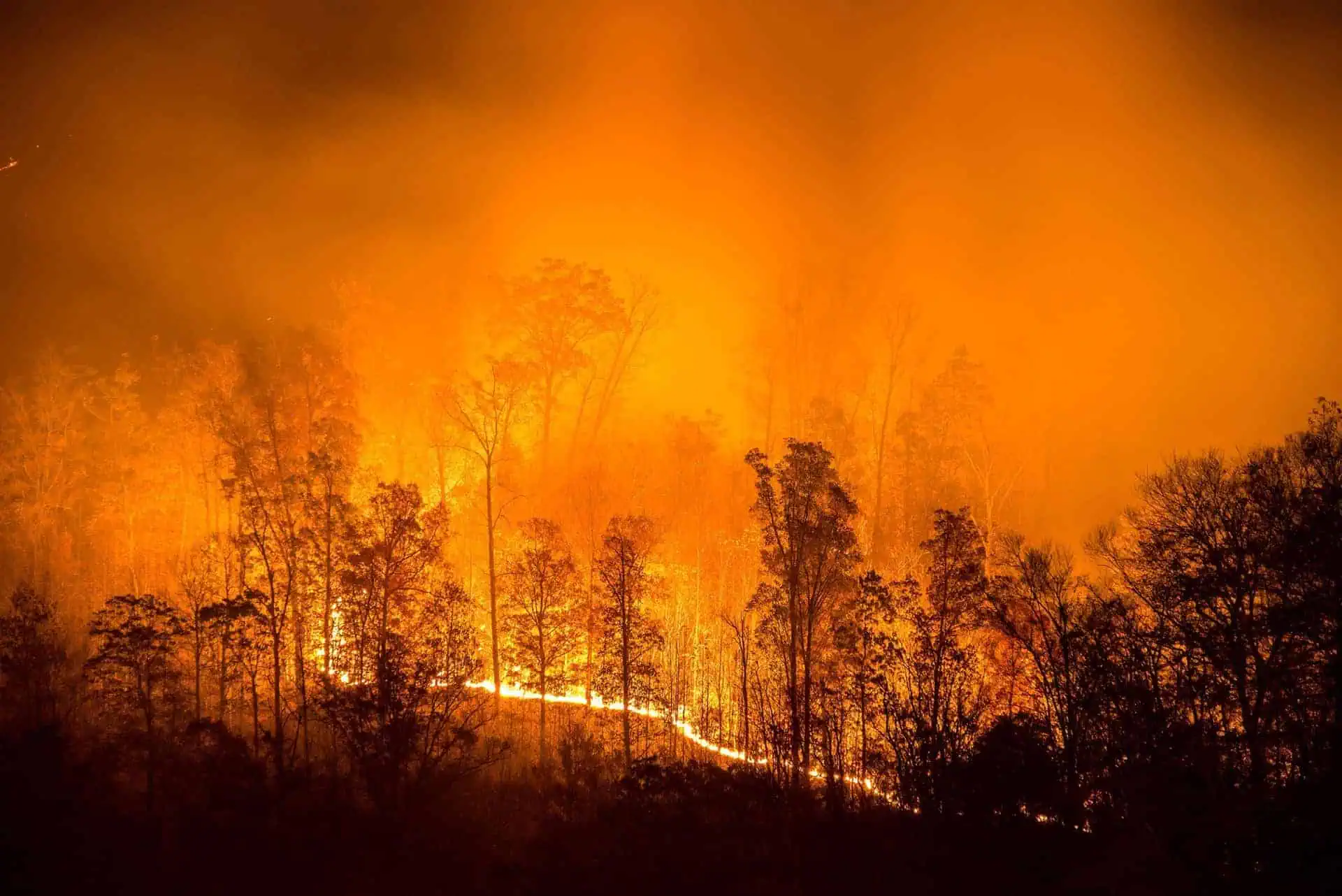Maui Wildfires Lawsuit | Maui Wildfire Lawyers
- Last Updated: June 12th, 2025

Attorney Jessica Paluch-Hoerman, founder of TruLaw, has over 28 years of experience as a personal injury and mass tort attorney, and previously worked as an international tax attorney at Deloitte. Jessie collaborates with attorneys nationwide — enabling her to share reliable, up-to-date legal information with our readers.
Legally Reviewed
This article has been written and reviewed for legal accuracy and clarity by the team of writers and legal experts at TruLaw and is as accurate as possible. This content should not be taken as legal advice from an attorney. If you would like to learn more about our owner and experienced injury lawyer, Jessie Paluch, you can do so here.
Fact-Checked
TruLaw does everything possible to make sure the information in this article is up to date and accurate. If you need specific legal advice about your case, contact us by using the chat on the bottom of this page. This article should not be taken as advice from an attorney.
Key takeaways:
- The Maui wildfires that occurred in August 2023 have led to significant legal actions against Hawaiian Electric Industries and its subsidiaries.
- Allegations suggest that Hawaiian Electric's negligence may have contributed to the severity of the fires.
- Affected individuals are filing lawsuits to seek compensation for the damages and losses they experienced due to the wildfires.
Maui Wildfires Lawsuit Overview
On this page, we’ll discuss an overview of the Maui Wildfires Lawsuit, damages that can be claimed in the Maui Wildfire Lawsuits, examples of other recent wildfire disasters, and much more.
Intro to the Maui Wildfire Lawsuits
The island of Maui experienced severe wildfires that resulted in extensive damage to homes, landscapes, and infrastructure.
The fires caused significant distress for residents and had a devastating impact on the local environment.
Following the wildfires, legal action has been initiated.
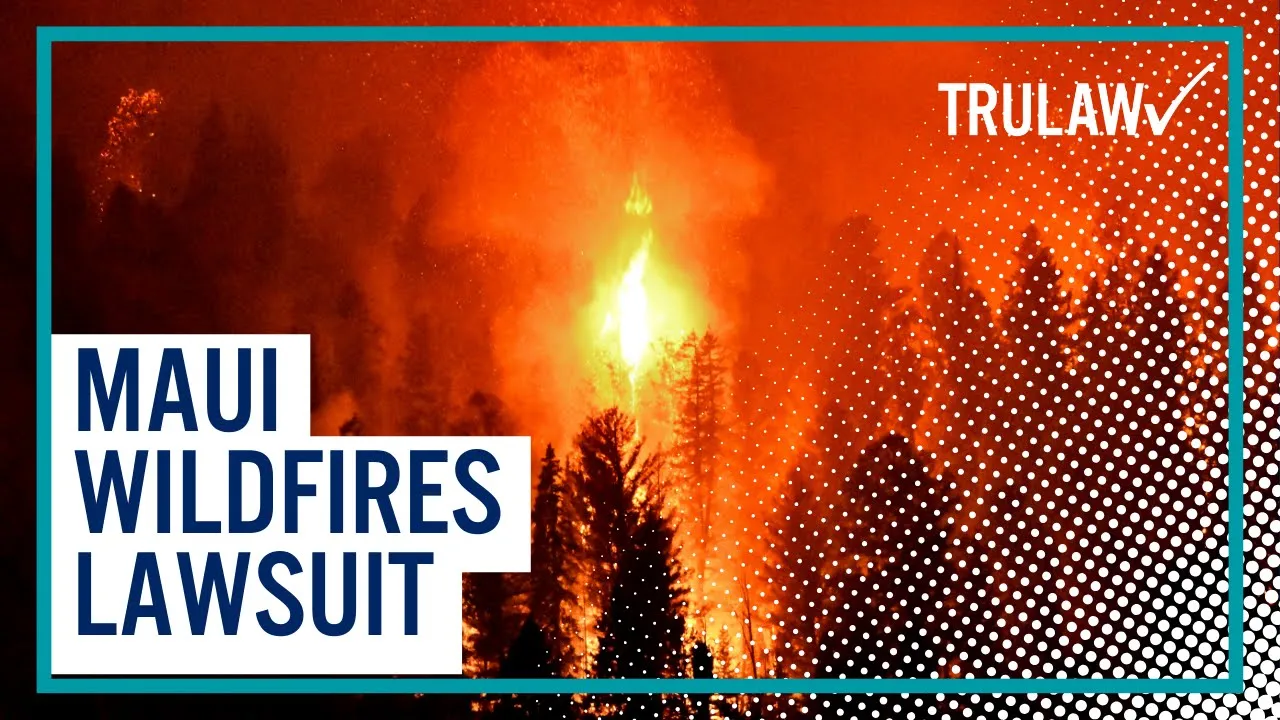
The aim of these legal proceedings is not only to seek compensation for the losses suffered, but also to prevent such an incident from occurring again in the future.
According to a report in the Washington Post, a series of legal battles is expected.
This pending litigation is against entities that are believed to have caused the wildfires.
The objective of these legal proceedings is to seek compensation for the damage caused and to ensure that measures are put in place to prevent such an incident from happening again.
The lawsuits are an important step in the recovery process for the residents of Maui (and, inherently, Maui County).
They serve as a means of seeking justice for the destruction caused by the wildfires and as a deterrent to prevent similar incidents in the future.
Table of Contents
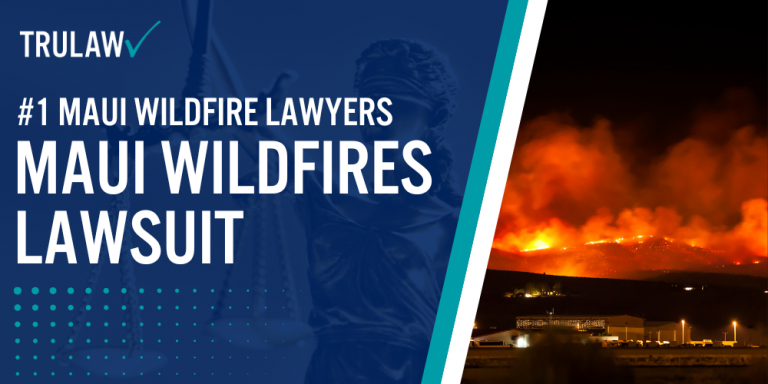
Background of the Maui Wildfires
The Maui wildfires have been significantly exacerbated by utility-related incidents.
These fires are frequently triggered by power lines or other equipment from utility companies that fail due to lack of maintenance or adverse weather conditions.
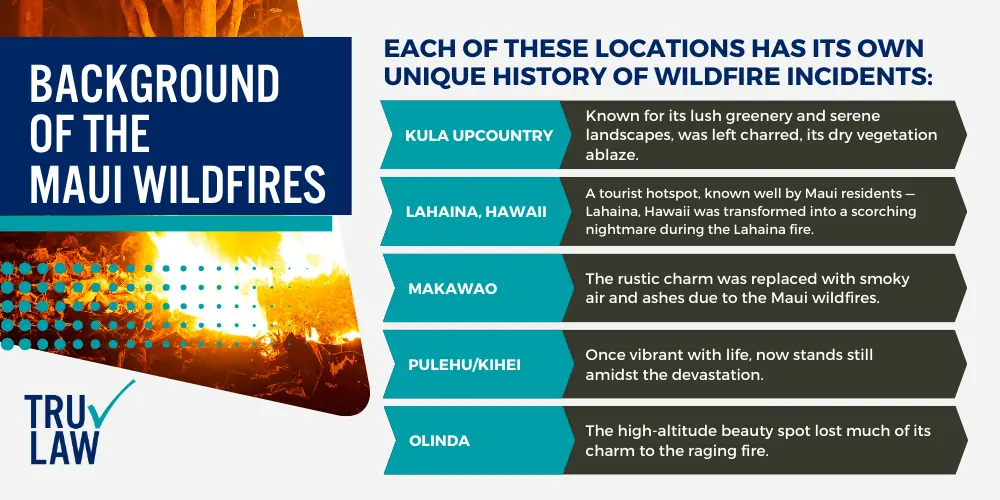
In Maui, there have been several specific sites where such wildfires have occurred.
These include Kula Upcountry, Lahaina, Makawao, Pulehu/Kihei, and Olinda.
Each of these locations has its own unique history of wildfire incidents:
- Kula Upcountry: Known for its lush greenery and serene landscapes, was left charred, its dry vegetation ablaze.
- Lahaina, Hawaii: A tourist hotspot, known well by Maui residents — Lahaina, Hawaii was transformed into a scorching nightmare during the Lahaina fire.
- Makawao: The rustic charm was replaced with smoky air and ashes due to the Maui wildfires.
- Pulehu/Kihei: Once vibrant with life, now stands still amidst the devastation.
- Olinda: The high-altitude beauty spot lost much of its charm to the raging fire.
The damage caused by these wildfires and hurricane winds, both examples of extreme weather events linked to climate change, is nothing short of catastrophic.
The Maui wildfires have a significant impact on the local environment and community.
This can be compared to other significant wildfires caused by utilities, such as the PG&E Camp Fire in California and the PacifiCorp fire in Oregon.
The following metrics provide a comparison of these wildfires:
Maui Wildfire:
- Acres Burned: 2,200+ acres
- Structures Damaged: ~2,200 structures
- Lives Lost: 115 people (as of 8/21)
PG&E Camp Fire:
- Acres Burned: 153,000+ acres
- Structures Damaged: ~ 18,800 structures
- Lives Lost: 85 people
Pacificorp (Oregon):
- Acres Burned: 1,200,000+ acres
- Structures Damaged: ~ 5,000 structures
- Lives Lost: 9 people
This comparison illustrates the severe impact of utility-caused wildfires in different regions.
These wildfires are not limited to Maui and are part of a larger pattern that can be observed in various vulnerable regions.
Each of these regions has its own experiences of loss and damage due to these fires.
Understanding Utility-Caused Wildfires
The phenomenon of wildfires caused by utilities, specifically power lines, is a serious concern.
Instances of trees or branches falling onto power lines can result in the ignition of wildfires, as has been documented in various instances such as the 2018 Camp Fire in California.
The Hazard of Trees Interacting with Power Lines
The interaction between trees and power lines can result in dangerous situations.
When trees or branches come into contact with power lines, it can lead to the generation of electrical sparks.
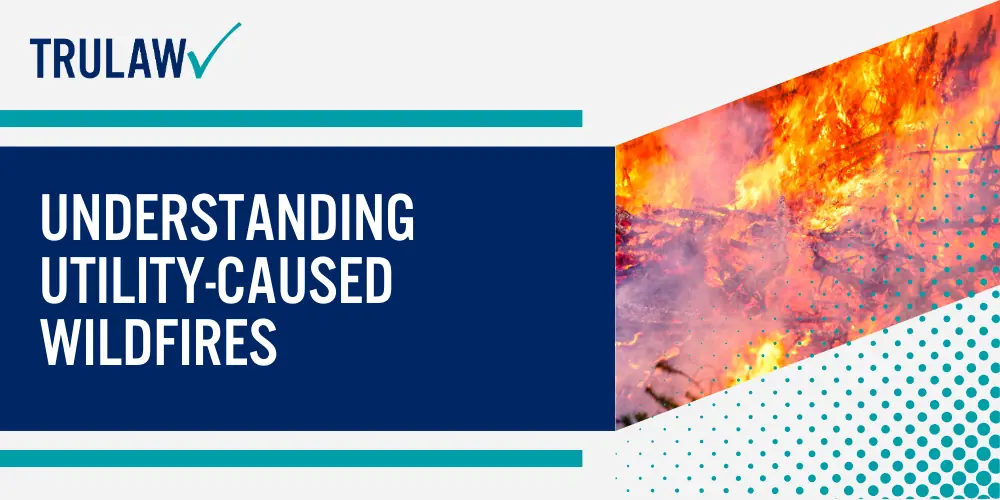
These sparks can ignite dry vegetation in the vicinity, leading to the start of wildfires.
The 2018 Camp Fire in California is an example of a wildfire that was triggered by sparks from utility equipment.
Measures for Prevention
Expensive but Necessary.
Electric companies, a type of utility company, are often required to invest heavily in preventive measures.
These measures, which include trimming vegetation around power lines and insulating or burying them underground, can help mitigate the risk of wildfires:
- Trimming Vegetation: The practice of regularly trimming trees near power lines can reduce the risk of them falling onto the lines and causing sparks.
- Insulating Power Lines: By covering power lines with a protective material, the risk of sparks can be reduced. This is achieved by effectively de-energizing the lines.
- Burying Power Lines: Although this is a costly measure, it significantly reduces the likelihood of wildfires caused by utilities.
Historical Approach of Utility Companies — Reactive vs Proactive
Historically, utility companies have predominantly adopted a reactive approach when dealing with wildfires (eg. holding a news conference).
This approach involved addressing the problem of wildfires after they occurred, rather than taking preventative measures to avert them.
This could be likened to treating a disease after it has manifested, as opposed to taking vaccines to prevent its occurrence.
However, legal actions such as the Maui wildfires lawsuit have instigated significant changes in this approach over time.
Currently, more companies are adopting proactive strategies within their operations for wildfire prevention, due to the potential legal implications.
One notable example is Pacific Gas and Electric (PG&E), which was found liable for several destructive fires in California that were caused by equipment failures.
The financial burden of multiple lawsuits led the power company to file for Chapter 11 bankruptcy.
The key takeaway from these situations is that while the implementation of preventative measures may appear expensive initially for utility companies, the failure to do so could lead to disastrous outcomes.
These could be financial, through lawsuits such as the Maui wildfires lawsuit, or more significantly, the loss of human lives and environmental damage caused by these avoidable disasters.
Lawsuits Arising from the Maui Wildfires
Hawaiian Electric in the Hot Seat
The aftermath of the devastating Maui wildfires saw a flurry of lawsuits filed against several entities, including Hawaiian Electric, the government, and others.
Plaintiffs in the Maui wildfires lawsuit claimed these parties failed to adequately manage and respond to the wildfire threat.
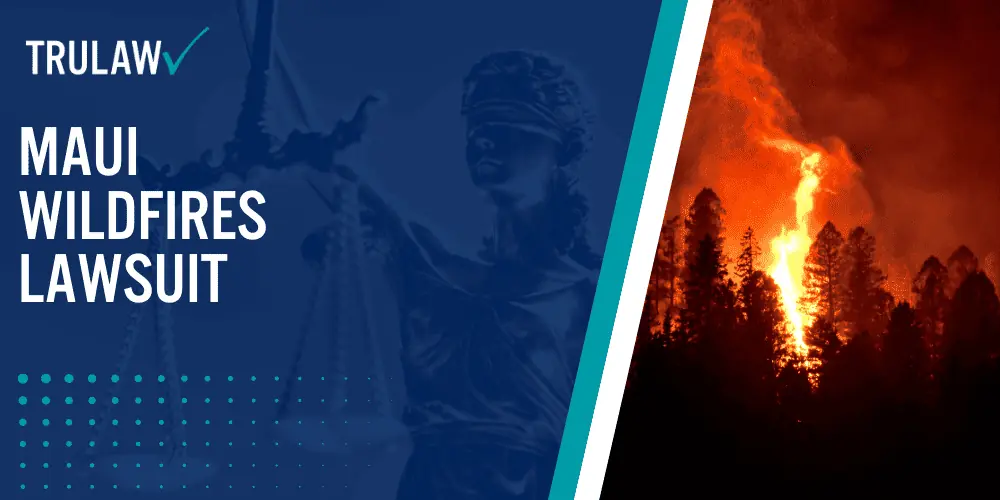
At the heart of these allegations is Hawaiian Electric’s supposed negligence.
The electric company has been accused of not de-energizing power lines during high-risk periods (also known as a public power shutoff plan), which will now delay grid modernization projects.
This alleged mismanagement led to sparks that initiated the deadly wildfire ignition, igniting dry vegetation and causing widespread wildfires.
Here are some key points raised in the lawsuits:
- Failure to enforce safety measures: Critics argue that Hawaiian Electric didn’t adhere to precautionary measures like regular inspections and maintenance of their equipment.
- Conscious indifference: Allegedly, despite being aware of adverse weather conditions conducive to wildfires, the company displayed conscious indifference by taking no action.
- Lack of emergency response plans: It’s claimed there were no effective strategies in place for responding swiftly to prevent small fires from escalating.
The Class Action Lawsuit
In addition to individual suits, a class-action lawsuit has also been filed against Hawaiian Electric Industries (HEI).
This legal action represents a group of plaintiffs who, this lawsuit alleges, have had their interests adversely affected by HEI’s alleged negligence.
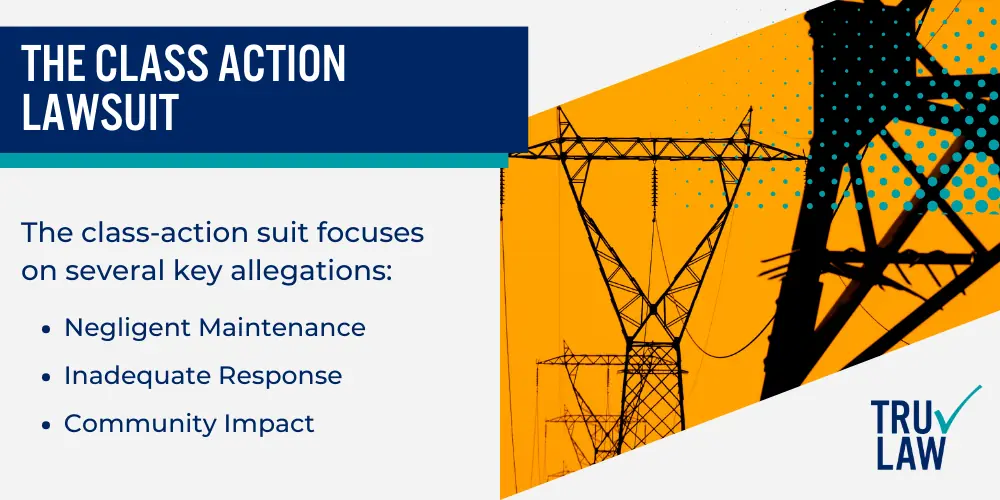
The class-action suit focuses on several key allegations:
- Negligent Maintenance: HEI supposedly did not maintain its infrastructure properly which led to equipment failure and subsequent fires.
- Inadequate Response: HEI allegedly failed to react promptly or effectively when initial fire outbreaks occurred.
- Community Impact: The suit highlights significant damage caused by fires – property loss, environmental harm, and emotional distress among residents.
The ongoing legal battles highlight the importance for utility companies (such as Hawaiian Electric Industries) to place safety above financial gain.
People and their homes should always be placed above company profits.
Legal Implications and Responsibilities
Utility Companies’ Role
Power companies, such as those providing electricity through power lines, have a significant role in preventing wildfires.
The 2018 Camp Fire in California
Pacific Gas & Electric (PG&E) was held responsible for the disaster.
The deadly wildfire, one of many recent wildfires, sparked from their equipment resulted in 85 deaths and scorched over 150,000 acres — making it the deadliest of these wildfires in over a century.
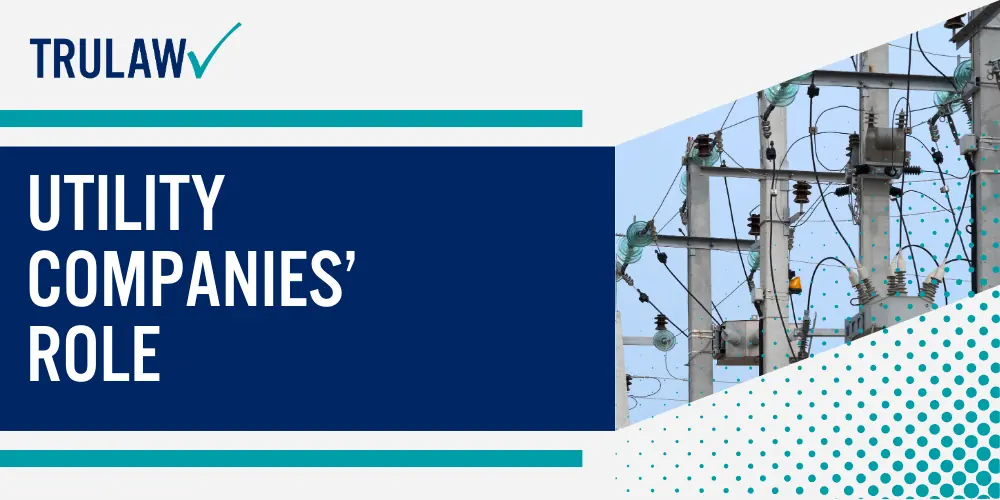
It led to PG&E’s bankruptcy due to the billions of dollars they had to pay out in damages.
In the case of Maui wildfires, if negligence from any utility company such as Hawaiian Electric is found contributing to the fire’s ignition or spread, they could be held legally accountable.
They could face lawsuits from victims seeking compensation for their losses.
Rights of Wildfire Victims
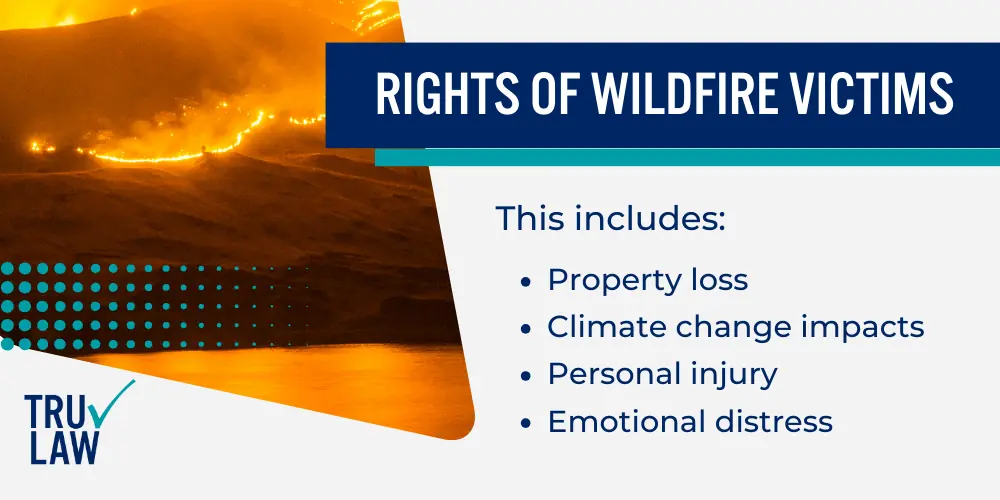
Victims affected by deadly wildfires have legal rights to seek justice and compensation for their losses.
This includes:
- Property loss: Homes, vehicles, personal belongings destroyed by the fire.
- Climate change impacts: Damage to land, water sources and air quality due to environmental contamination.
- Personal injury: Burns, smoke inhalation injuries or other physical harm caused by the fire.
- Emotional distress: Trauma or mental health issues resulting from experiencing a wildfire.
If you’ve been affected by a wildfire like those on Maui, knowing your rights is crucial for getting fair compensation.
The rights of individuals affected by wildfires are complex and vary depending on the specific circumstances.
It is recommended that those affected seek legal counsel from an attorney who specializes in wildfire cases.
This is due to the complexity of the legal processes involved in these cases.
It is not reasonable to expect individuals who have suffered from such disasters to understand and navigate these legal processes alone.
The Human Toll of the Maui Wildfires
The Numbers Speak for Themselves
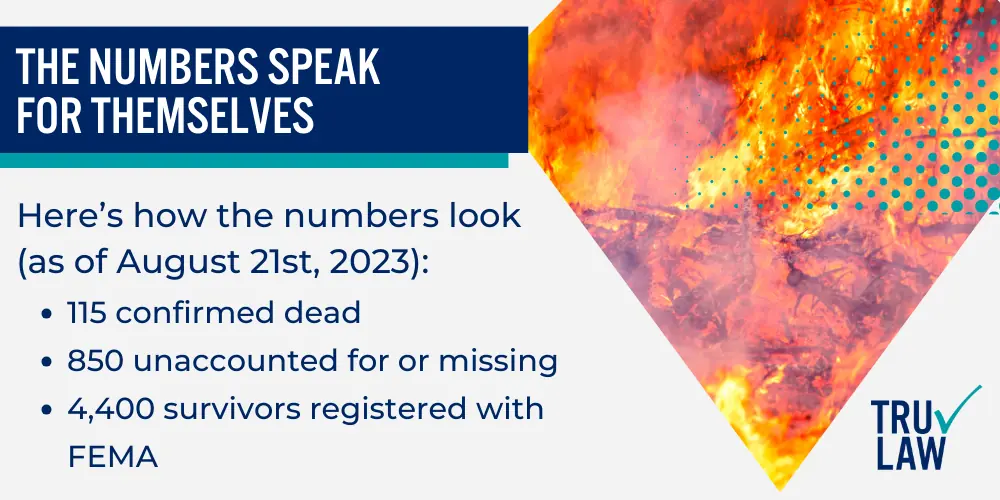
The Maui wildfires lawsuit is more than just a legal battle.
It’s about real people that have had their lives turned upside down.
Here’s how the numbers look (as of August 21st, 2023):
- 115 confirmed dead
- 850 unaccounted for or missing
- 4,400 survivors registered with FEMA
These aren’t just stats on a sheet. Each one represents someone’s life story.
Lahaina’s Population Overview: A Community in Mourning
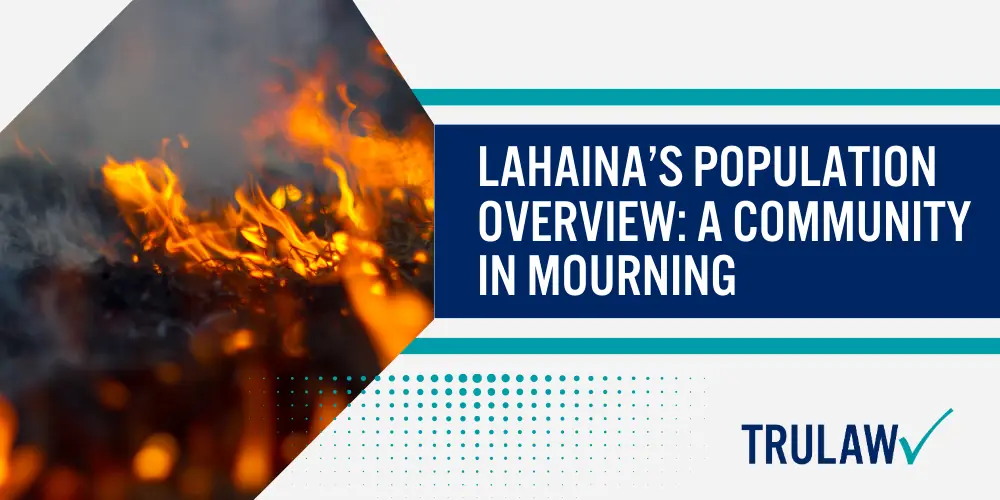
Lahaina, a vibrant community in Maui County, known for its lush landscapes, took a massive hit, according to the Hawaii Gov.
Imagine waking up one day to find your town ablaze and everything you know in ashes.
That’s what happened to the people in Lahaina.
Given that the overall population of Maui, including Lahaina residents, is around 144,000 people (as per US Census Bureau), this disaster affected nearly every person directly or indirectly – whether they lost their homes, loved ones, or even their sense of security.
Steps to Take if Affected by the Maui Wildfires
The primary emphasis in the event of a Maui wildfire should be on safeguarding oneself.
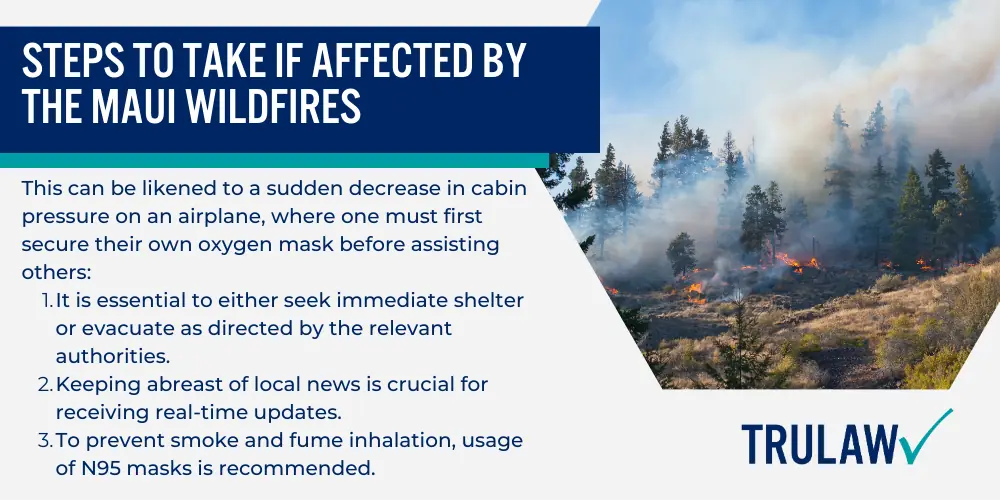
This can be likened to a sudden decrease in cabin pressure on an airplane, where one must first secure their own oxygen mask before assisting others:
- It is essential to either seek immediate shelter or evacuate as directed by the relevant authorities.
- Keeping abreast of local news is crucial for receiving real-time updates.
- To prevent smoke and fume inhalation, usage of N95 masks is recommended.
It is important to note that material possessions can be replaced, while human lives cannot.
Documenting Damages
Once safe, it’s time to assess and document the damages for insurance claims and potential legal action.
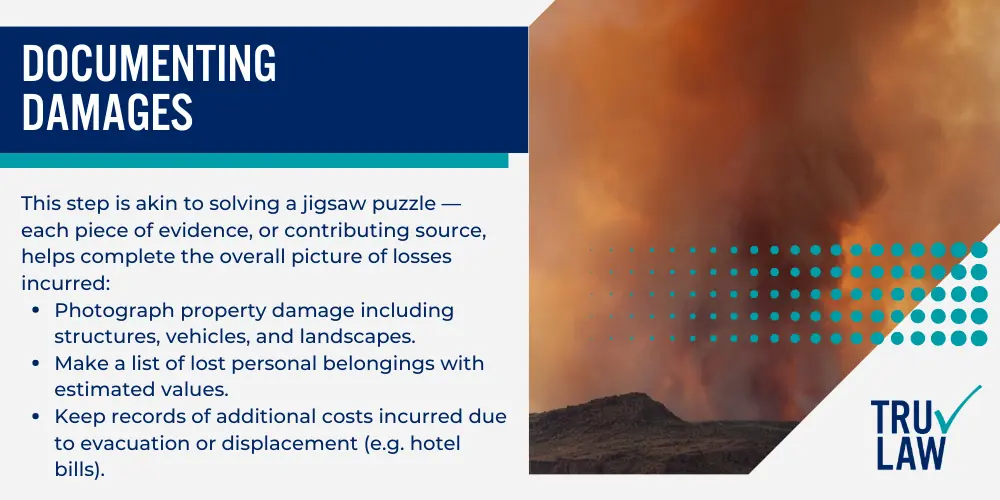
This step is akin to solving a jigsaw puzzle — each piece of evidence, or contributing source, helps complete the overall picture of losses incurred:
- Photograph property damage including structures, vehicles, and landscapes.
- Make a list of lost personal belongings with estimated values.
- Keep records of additional costs incurred due to evacuation or displacement (e.g. hotel bills).
It’s crucial to document these damages — not just because it could mean getting compensated for your losses, but also because it provides the necessary concrete proof when dealing with insurers or lawyers.
Legal Counsel & Lawsuit Filing
Now comes the part where you might want to consider seeking legal counsel.
Your legal counsel is your guide while navigating these unchartered waters — so it’s crucial you do your diligence when hiring them.
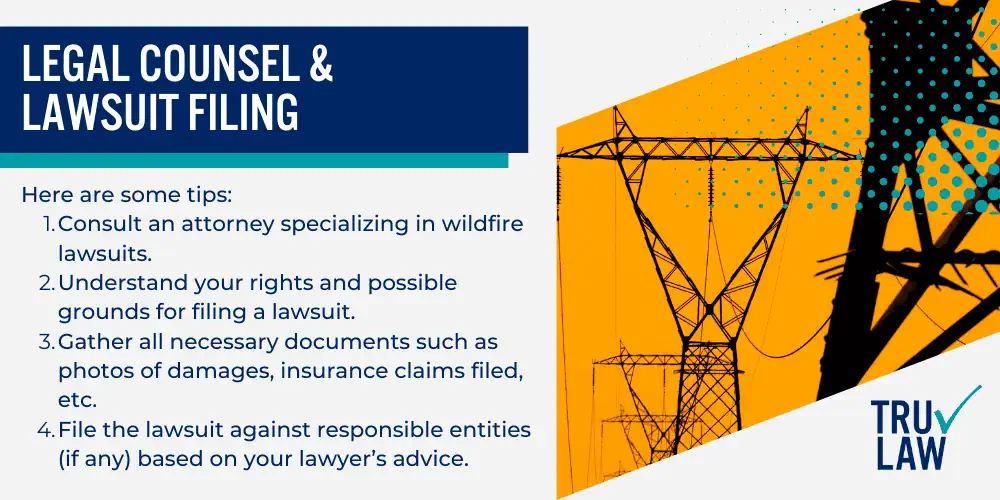
Here are some tips:
- Consult an attorney specializing in wildfire lawsuits.
- Understand your rights and possible grounds for filing a lawsuit.
- Gather all necessary documents such as photos of damages, insurance claims filed, etc.
- File the lawsuit against responsible entities (if any) based on your lawyer’s advice.
Preventive Measures and Future Outlook
Utility Companies & Government Role
The National Weather Service, utility companies, and the government play a crucial role in wildfire prevention.
For instance, they are responsible for maintaining power lines and other infrastructure that can spark fires when not properly managed.
There have been instances where negligence led to devastating wildfires, such as the Maui wildfires lawsuit that aims to hold utility companies accountable for their actions.
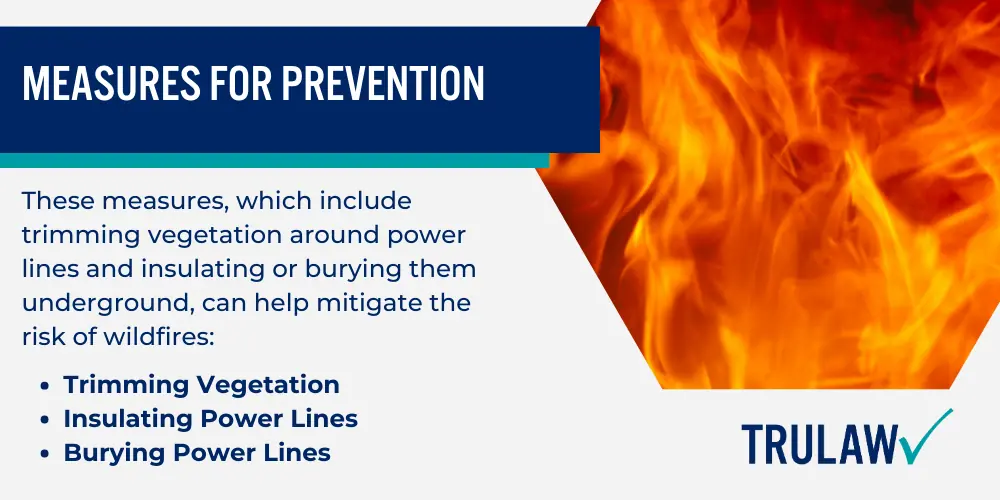
The Maui wildfire lawsuits further aim to encourage these entities to put proactive measures in place that could help prevent disasters like this in the futures — these measures include, but are not limited to:
- Regular maintenance of power lines
- Clearing vegetation from around power lines
- Implementing strict fire safety regulations
- Investing in advanced technology for grid modernization projects to detect potential fire hazards early, supporting emergency response efforts, and enhancing the utility system.
The government also has a role in enforcing these measures and providing adequate funding for wildfire prevention efforts.
Residents’ Responsibilities
Local officials and residents alike have a part to play in preventing wildfires.
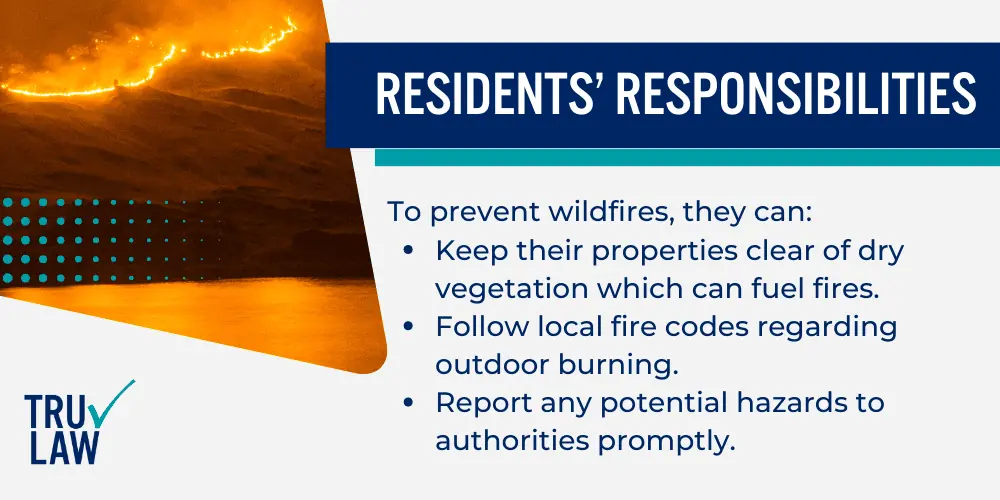
To prevent wildfires, they can:
- Keep their properties clear of dry vegetation which can fuel fires.
- Follow local fire codes regarding outdoor burning.
- Report any potential hazards to authorities promptly.
Community collaboration is key here — residents acting as vigilant neighbors looking out for each other’s properties can go a long way towards preventing fires.
Preparedness & Accountability
Preparedness cannot be overstated.
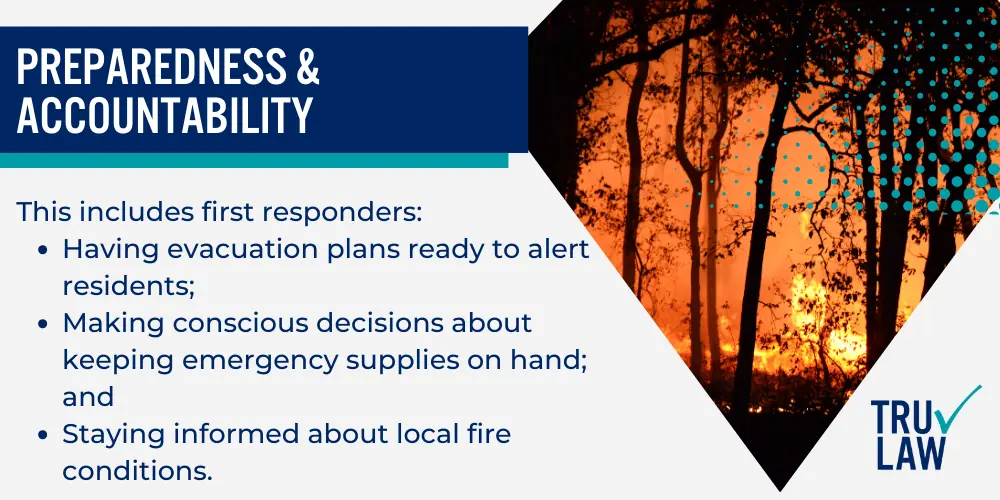
This includes first responders:
- Having evacuation plans ready to alert residents;
- Making conscious decisions about keeping emergency supplies on hand; and
- Staying informed about local fire conditions.
Conclusion: The Maui Wildfire Lawsuits
The Maui wildfires have had a profound impact, causing immense damage and sparking numerous lawsuits.
It’s crucial to understand the legal implications and responsibilities tied to these incidents.
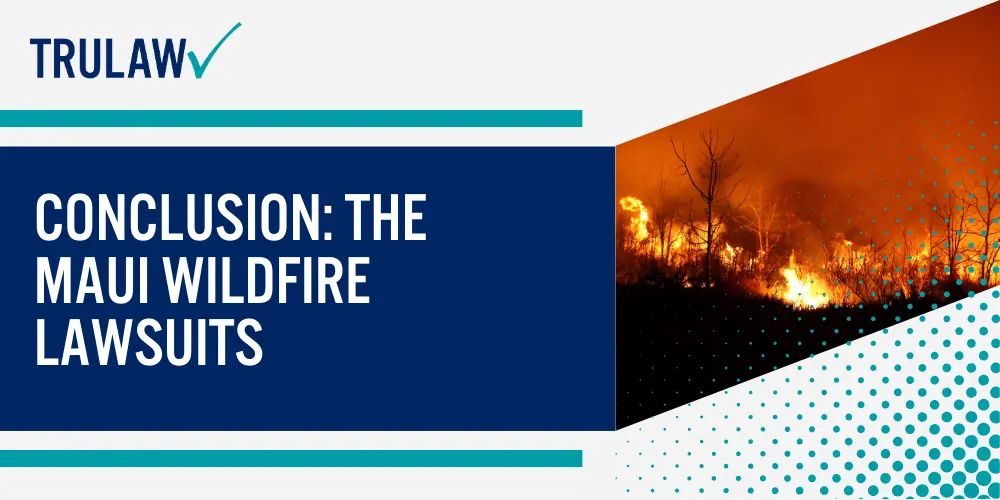
If you’ve been affected by the wildfires and are in the clean-up and recovery phase of this catastrophe, taking the right steps can help you navigate through this challenging time — safely.
These steps can also help tremendously when trying to claim compensation for the damages and losses experienced by you and/or your loved ones.
A Hope for Proactive Wildfire Prevention Measures Moving Forward
Lastly, it’s essential for everyone to be proactive about wildfire prevention.
Looking ahead, let’s hope for stricter power utility regulations and more effective preventive measures.
Remember, your conscious decisions and actions can make a big difference in preventing future catastrophes.
Stay informed, stay safe!
Maui Fire Lawsuit Frequently Asked Questions
-
How did the Maui wildfires start?
Maui wildfires ignited due to a combination of factors, including vegetation, wind gusts, and atmospheric conditions.
These factors include, but are not limited to:
- The fires began in vegetation.
- Wind gusts exceeding 60mph exacerbated the situation.
- The fires spread rapidly to populated areas, including Lahaina.
- The exact cause remains undetermined.
- The presence of Hurricane Dora and power line disruptions played significant roles.
The fires began in vegetation
The initial ignition point for the Maui wildfires was in areas with dense vegetation.
This provided ample fuel for the fires to grow and spread.
Wind gusts exceeding 60mph exacerbated the situation
Strong wind gusts, some reaching speeds of over 60mph, played a crucial role in the rapid spread of the fires.
These winds made it challenging to control the flames and predict their movement.
The fires spread rapidly to populated areas, including Lahaina
Due to the winds and the fire’s intensity, it quickly reached populated areas, putting many lives and properties at risk.
The historic town of Lahaina was one of the most affected areas.
The exact cause remains undetermined
While the initial ignition point is known, the exact cause or event that started the fire is still under investigation.
Factors like human activity or natural occurrences could be potential causes.
The presence of Hurricane Dora and power line disruptions played significant roles
The island was experiencing strong winds and low humidity, which were intensified by the nearby Hurricane Dora.
Additionally, power line disruptions and downslope winds further fueled the fires, making them even more challenging to contain.
-
What is the current death toll in the Maui fires?
The impact of the Maui wildfires on the local community has been devastating.
Current Death Toll
- As of August 21st, 2023, the Maui wildfires have tragically claimed the lives of 115 people.
- As of September 18th, 2023, authorities have adjusted the number of deaths from the Maui fires down to at least 97 people.
The number of those who are missing also fell from 41 to 31 according to Maui Police Chief John Pelletier.
This number reflects the severity and rapid spread of the fires, emphasizing the importance of safety measures and preparedness in such situations.
-
Have the Maui fires been contained?
The situation in Maui remains critical, with fires causing extensive damage and displacing many residents and tourists:
- Containment Status: As of August 21st, the fires have not been fully contained.
- The fires have resulted in the death of at least 115 people.
- Tens of thousands have been forced to evacuate.
- Significant damage has been inflicted on the historic resort city.
Containment Status
As of the latest reports, the Maui wildfires have not been fully contained.
Efforts are ongoing, with firefighters and emergency services working tirelessly to control the situation.
To conclude, the Maui wildfires continue to pose a significant threat, with ongoing efforts to contain them and ensure the safety of all affected individuals.
-
Are people from outside of Hawaii buying the properties of Lahaina fire victims?
The aftermath of the Maui fires has raised concerns about property acquisitions in Lahaina.
These concerns boil down to the follow two (2) items:
- Property Acquisitions: There are reports of non-residents expressing interest in buying properties in Lahaina.
- Possible Moratorium: Governor Josh Green and Attorney General Anne Lopez are investigating the matter.
Property Acquisitions
In the wake of the fires, there have been concerns about individuals from outside Hawaii attempting to purchase properties in Lahaina, especially those belonging to fire victims.
Such acquisitions can have implications for the local community and its recovery efforts.
Possible Moratorium
To address these concerns, Governor Josh Green and Attorney General Anne Lopez are exploring the possibility of implementing a moratorium on non-residents buying properties in Lahaina.
This move aims to protect the interests of the local community and ensure a fair recovery process.
-
Can firefighters use water from the ocean?
Yes, firefighters can use seawater to extinguish fires.
While firefighters typically get water from tanks inside fire engines and external sources like fire hydrants, which are filled from underground water systems — in coastal areas or during emergencies, seawater can be utilized.
However, it’s worth noting that while seawater is effective in putting out fires, the salt content can be corrosive to firefighting equipment, so it’s essential for firefighters to rinse the equipment thoroughly after use.
-
I’m trying to find a missing person on Maui. Where do I start?
Locating missing persons in emergency situations is a top priority.
In the aftermath of the Maui fires, locals have taken proactive steps to help locate missing individuals by launching online trackers.
The following platforms aim to consolidate information and assist in the search efforts:
- “Maui Fires People Locator“: A Google spreadsheet setup by locals.
- “Maui Fires People Finder“: A Facebook page setup by locals.
- The New York Post has published an article with more information.
Maui Fires People Locator
This Google spreadsheet has been created to gather and share information about missing individuals.
People can add details of missing persons and update the status if someone is found.
Maui Fires People Finder
This Facebook page serves as a community platform where users can post about missing individuals, share updates, and coordinate search efforts.
The New York Post has published an article with more information
For a more comprehensive overview and additional resources, the New York Post has published an article detailing the efforts to locate missing persons in Maui.
More information can be found in this New York Post article.
-
Can I visit Maui? Should I cancel my trip to Hawaii?
These questions are best answered separately:
Can I visit Maui?
- The Hawaiian island of Maui is currently requesting visitors to stay away as it tries to recover from devastating wildfires.
- Two of the three fires on Maui were largely contained as of the latest update. However, the damage, especially in the tourism-heavy region of West Maui, is extensive. The historic town of Lahaina in West Maui appears to have suffered significant damage.
- The Kahului Airport on Maui remains open, but officials have asked visitors on “non-essential” trips to leave due to the wildfires.
- The Hawaiian government is strongly discouraging tourists from coming to the island due to the wildfires causing significant deaths and economic losses.
Should I Cancel My Trip to Hawaii?
- The state tourism authority has emphasized that most parts of Hawaii continue to welcome visitors. Travel to Kauaʻi, Oʻahu, Molokaʻi, Lānaʻi, and parts of Hawaiʻi Island other than the Mauna Kea resort area are not affected.
- However, for Maui, especially West Maui, the tourism authority advises visitors to consider rescheduling their travel plans for a later time. They emphasize that resources and attention need to be focused on the recovery of residents and communities affected by the fires.
Given the current situation in Maui and the ongoing recovery efforts, it’s advisable to reconsider travel plans to the island, especially if they are non-essential.
If you have bookings, it’s recommended to contact your airline, hotel, or booking platform directly to understand your options for cancellations or rescheduling.
-
How are travel companies accommodating customers whose trips are impacted by the Maui wildfires?
Travel companies are accommodating customers, whose trips are impacted by the Maui wildfires, in various ways.
These differ from company to company, but we’ve done our best to highlight some of these accommodations below:
Flight Adjustments:
Major airlines are offering options for travelers to obtain refunds or reschedule their flights to Maui.
The terms vary depending on the airline:
- United Airlines: Offers a refund for flights to Kahului Airport between Aug. 11 and Aug. 31. Rescheduling options are available with waived change fees and fare differences under specific conditions.
- Delta Air Lines: Allows customers to cancel their reservations to Maui and apply the ticket cost to a new flight, with certain conditions.
- American Airlines: Suggests possible refunds for flights to or through Maui if canceled by Aug. 13. Rescheduling options are available with waived change fees under specific conditions.
- Alaska Airlines: Offers refunds for tickets to or from Maui purchased by Aug. 9 if canceled before the original flight’s departure date. Rescheduling options are available under specific conditions.
- Hawaiian Airlines: Allows customers to cancel or change their flights. For specific details, travelers are advised to contact the airline’s reservations line.
Hotel Bookings:
- Some hotels in West Maui are waiving cancellation fees. However, the policy may vary depending on the hotel and its proximity to the affected areas.
- Major hotel chains like Hyatt, Marriott, and others have provided specific guidelines for cancellations and rescheduling. It’s recommended to contact the hotel directly for detailed information.
Vrbo or Airbnb Bookings:
- Expedia Group, which owns Vrbo, is offering full refunds for eligible Vrbo reservations in Maui.
- Airbnb is providing penalty-free cancellations in parts of Maui for hosts and guests who request them. However, travelers need to contact Airbnb’s customer service to verify eligibility.
Travel Insurance:
If you have travel insurance, it’s essential to check if wildfires fall under the definition of “natural disaster” on your policy.
Coverage may vary depending on the specifics of the policy and when it was purchased.
-
What are some common causes of wildfires?
Understanding the origins of wildfires is essential for prevention and safety.
Common causes of wildfires include, but are not limited to:
- Human activities
- Unattended campfires
- Burning of debris
- Equipment malfunctions
- Discarded cigarettes
- Arson
Human activities
A significant number of wildfires are attributed to human activities.
Whether intentional or accidental, these actions can lead to devastating consequences, affecting vast areas and endangering lives.
Unattended campfires
One of the most common causes of wildfires is unattended campfires.
Campers and hikers must ensure that their campfires are fully extinguished before leaving the site to prevent the spread of fire.
Burning of debris
Burning leaves, branches, and other debris can quickly get out of control, especially in dry conditions.
It’s essential to monitor such fires closely and ensure they are contained.
Equipment malfunctions
Machinery and equipment, especially those used in agriculture and construction, can malfunction and produce sparks.
These sparks, when coming into contact with dry vegetation, can ignite fires.
Discarded cigarettes
Improperly discarded cigarettes, especially in dry areas, can lead to wildfires.
It’s crucial for smokers to ensure that their cigarettes are fully extinguished and disposed of safely.
Arson
Sadly, some wildfires are a result of intentional acts of arson.
These malicious acts can lead to widespread destruction and loss of life.
-
How can I protect my property from wildfires?
Paying attention to weather and drought conditions can help in protecting properties from wildfires.
Avoid activities that can spark fires, especially during dry and windy conditions. Here are some additional measures to consider:
- Fortify Your Roof: The likelihood of your home surviving a wildfire is largely based on its construction and the materials used. Consider installing or replacing your roof with a Class A-rated roof that uses noncombustible coverings.
- Maintain a Defensible Space: Create a buffer zone around your property by clearing away dead vegetation, trimming trees, and keeping grass short. This space can help slow or stop the spread of wildfire and protect your home from catching fire.
- Use Fire-Resistant Building Materials: When building or renovating, opt for fire-resistant materials for siding, decks, and fences.
- Install Spark Arresters: Place mesh coverings over vents and chimney outlets to prevent embers from entering your home.
- Regularly Clean Gutters and Roofs: Accumulated leaves and debris can be potential fuel for wildfires. Ensure that they are regularly cleaned.
- Position Propane Tanks Away from Structures: Ensure that propane tanks are at least 30 feet away from buildings and surrounded by a 10-foot clearance zone.
- Emergency Water Supply: Have an emergency water source, such as a well or a pool, and ensure you have hoses that can reach all areas of your property.
- Plan and Practice Evacuation: Have an evacuation plan in place and practice it with family members. Ensure everyone knows multiple routes out of your neighborhood.
For a comprehensive guide on protecting your property from wildfires, you can refer to resources provided by agencies like FEMA.
-
What should I do if I'm affected by a wildfire?
Safety is paramount when faced with the threat of a wildfire.
If you are affected by a wildfire, here are some tips:
- Prioritize safety
- Wear protective clothing
- Wash off ash promptly if it comes into contact with skin or eyes.
- Children should be kept away from cleanup activities.
- Consider using an N95 respirator to minimize ash inhalation.
Prioritize Safety
If you find yourself in the vicinity of a wildfire, it’s essential to prioritize your safety and follow recommended guidelines to protect yourself and your loved ones.
Wear protective clothing
Protective clothing can shield you from ash, smoke, and other harmful particles.
Wearing gloves, long-sleeved shirts, long pants, shoes, and socks can help protect your skin.
Goggles can protect your eyes from ash and smoke.
Wash off ash promptly if it comes into contact with skin or eyes
If ash settles on your skin, eyes, or mouth, it’s crucial to wash it off immediately to prevent irritation or other health issues.
Children should be kept away from cleanup activities
Children are more susceptible to the harmful effects of ash and smoke.
It’s best to keep them away from areas affected by the fire and any cleanup activities.
Consider using an N95 respirator to minimize ash inhalation
An N95 respirator can filter out harmful particles from the air, reducing the risk of respiratory issues.
If you’re in an area with heavy ash or smoke, consider wearing one.
-
Can utility companies be held responsible for wildfires?
The role of utility companies in wildfire incidents is a topic of ongoing debate and investigation.
Here is a quick overview of this ongoing debate:
- Utility companies are potentially responsible for wildfires.
- Equipment or negligence from these companies can be a wildfire’s origin.
- Companies like Pacific Gas and Electric Co. (PG&E) have faced legal challenges related to wildfires (and some have filed bankruptcy following their legal challenges).
Potential Responsibility
Utility companies, especially those responsible for power lines and electrical equipment, can potentially be held responsible for wildfires.
If it’s determined that their infrastructure or negligence played a role in the ignition or spread of a fire, they might face legal consequences.
Equipment or negligence from these companies can be a fire’s origin
Faulty equipment, power line disruptions, or poor maintenance can lead to sparks that ignite wildfires.
In areas with dry vegetation, even a small spark can lead to a large-scale fire.
Companies like Pacific Gas and Electric Co. (PG&E) have faced legal challenges related to wildfires
For instance, PG&E, a major utility company, has been scrutinized and faced legal actions due to their potential role in starting wildfires.
Such cases highlight the importance of utility companies maintaining their equipment and infrastructure to prevent such incidents.
-
Are there any preventive measures against future wildfires?
Preventing wildfires is a collective effort that requires awareness and proactive measures.
Preventative measures against wildfires include, but are not limited to:
- Keeping an eye on weather and drought conditions is crucial.
- Activities involving fire or sparks should be avoided during risky conditions.
- Awareness and education play a significant role in prevention.
Weather Monitoring
One of the primary preventive measures against wildfires is to monitor weather conditions closely.
Droughts, high temperatures, and strong winds can make vegetation more flammable, increasing the risk of wildfires.
Activities involving fire or sparks should be avoided during risky conditions
During hot, dry, and windy conditions, it’s essential to be extra cautious.
Activities like campfires, burning debris, or using machinery that can produce sparks should be avoided or monitored closely.
Awareness and education play a significant role in prevention
Educating the public about the risks and preventive measures can significantly reduce the chances of human-caused wildfires.
Awareness campaigns, community workshops, and strict regulations can play a pivotal role in preventing wildfires.

Managing Attorney & Owner
With over 25 years of legal experience, Jessica Paluch-Hoerman is an Illinois lawyer, a CPA, and a mother of three. She spent the first decade of her career working as an international tax attorney at Deloitte.
In 2009, Jessie co-founded her own law firm with her husband – which has scaled to over 30 employees since its conception.
In 2016, Jessie founded TruLaw, which allows her to collaborate with attorneys and legal experts across the United States on a daily basis. This hypervaluable network of experts is what enables her to share the most reliable, accurate, and up-to-date legal information with our readers!
Additional Maui Fire Lawsuit resources on our website:
Here, at TruLaw, we’re committed to helping victims get the justice they deserve.
Alongside our partner law firms, we have successfully collected over $3 Billion in verdicts and settlements on behalf of injured individuals.
Would you like our help?
At TruLaw, we fiercely combat corporations that endanger individuals’ well-being. If you’ve suffered injuries and believe these well-funded entities should be held accountable, we’re here for you.
With TruLaw, you gain access to successful and seasoned lawyers who maximize your chances of success. Our lawyers invest in you—they do not receive a dime until your lawsuit reaches a successful resolution!
AFFF Lawsuit claims are being filed against manufacturers of aqueous film-forming foam (AFFF), commonly used in firefighting.
Claims allege that companies such as 3M, DuPont, and Tyco Fire Products failed to adequately warn users about the potential dangers of AFFF exposure — including increased risks of various cancers and diseases.
Depo Provera Lawsuit claims are being filed by individuals who allege they developed meningioma (a type of brain tumor) after receiving Depo-Provera birth control injections.
A 2024 study found that women using Depo-Provera for at least 1 year are five times more likely to develop meningioma brain tumors compared to those not using the drug.
Suboxone Tooth Decay Lawsuit claims are being filed against Indivior, the manufacturer of Suboxone, a medication used to treat opioid addiction.
Claims allege that Indivior failed to adequately warn users about the potential dangers of severe tooth decay and dental injuries associated with Suboxone’s sublingual film version.
Social Media Harm Lawsuits are being filed against social media companies for allegedly causing mental health issues in children and teens.
Claims allege that companies like Meta, Google, ByteDance, and Snap designed addictive platforms that led to anxiety, depression, and other mental health issues without adequately warning users or parents.
Transvaginal Mesh Lawsuits are being filed against manufacturers of transvaginal mesh products used to treat pelvic organ prolapse (POP) and stress urinary incontinence (SUI).
Claims allege that companies like Ethicon, C.R. Bard, and Boston Scientific failed to adequately warn about potential dangers — including erosion, pain, and infection.
Bair Hugger Warming Blanket Lawsuits involve claims against 3M — alleging their surgical warming blankets caused severe infections and complications (particularly in hip and knee replacement surgeries).
Plaintiffs claim 3M failed to warn about potential risks — despite knowing about increased risk of deep joint infections since 2011.
Baby Formula NEC Lawsuit claims are being filed against manufacturers of cow’s milk-based baby formula products.
Claims allege that companies like Abbott Laboratories (Similac) and Mead Johnson & Company (Enfamil) failed to warn about the increased risk of necrotizing enterocolitis (NEC) in premature infants.
Here, at TruLaw, we’re committed to helping victims get the justice they deserve.
Alongside our partner law firms, we have successfully collected over $3 Billion in verdicts and settlements on behalf of injured individuals.
Would you like our help?
